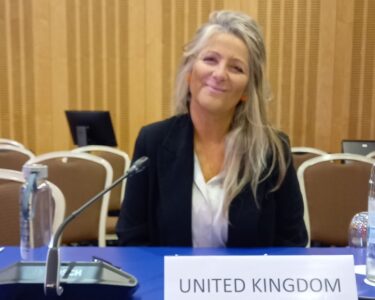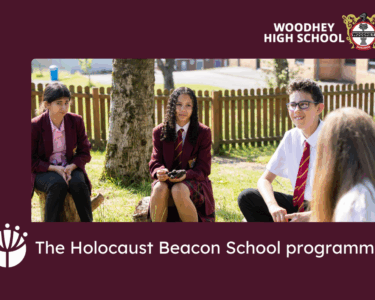If there are any lessons in the school year that I am determined to get ‘right’ it is those on the Holocaust. However, after just one lesson on the topic this year, lockdown came and our learning was forced online to the Microsoft Teams platform.
Teaching about the Holocaust remotely was a challenge, which involved reconfiguring the whole scheme of work. I feared that some of the impact of the lessons normally delivered face-to-face in the classroom would be diminished. In normal circumstances, the class would build-up an interactive timeline of the Holocaust working collaboratively across a series of lessons. Now, I now had to ask the pupils to do this independently and in a more limited fashion online. Nevertheless, this approach brought unexpected opportunities. Reworking the activity into a graph and using text boxes, the pupils could now ask themselves slightly different questions. For example, the extent of persecution as well as analysing important chronological changes in the evolution of the Holocaust.
Working remotely meant that the power of those in-classroom conversations with and between pupils was somewhat lessened. Nevertheless, with access to the resources and online CPD provided by the UCL Centre for Holocaust Education, alongside the magnificent engagement of the pupils, all was not lost. With reference to reputable websites such as those of the USHMM and The Wiener Holocaust Library’s ‘The Holocaust Explained’ the pupils were able to have discussions with parents and carers at home rather than with their peers.
The guiding principles of our scheme of work were informed by the approach and resources created by the UCL Centre for Holocaust Education. We thought that it was important to gain insight into Jewish life before the war – after all Jews were not put upon the planet suddenly in 1933, solely to become Hitler’s victims. Building from UCL’s ‘lockdown’ resource on Jewish life in Warsaw, I asked pupils to look at the rich and varied contributions made to society by Jews in countries such as Greece, Poland, Hungary and Germany.
Later, in our scheme of work, we examined a question from another of UCL’s resources: ‘Who was responsible for the Holocaust?’ Having traced the history of Auschwitz-Birkenau with the help of historian Laurence Rees via the website ww2history.com, our young historians looked again at a picture from the ‘Auschwitz Album’. That led to a discussion which ranged beyond Hitler to the role of the SS, train drivers, local people and others beyond the image.
Overall, I feel that this year’s lessons on the Holocaust were successful, albeit the circumstances. Before teaching this subject, I always ask pupils what they already know about the Holocaust. Many have some degree of knowledge although it tends to be limited and superficial, with many fundamental misconceptions. At the end of the topic the pupils complete an extended piece of writing, under timed conditions, and answer the question ‘What was the Holocaust?’ Even under lockdown I was delighted to see that the pupils were able to offer nuanced and sophisticated answers to the question. From an original narrative that did not go much beyond ‘Hitler sent German Jews to be gassed at Auschwitz-Birkenau’ following our lessons, the pupils were able to go much further in terms of conceptual, geographic and human understanding of the Holocaust. For instance, Harry wrote about victims such as the Greenman family explaining the role of collaborators such as Rene Bousquet, resisters like Mordecai Anielewicz and rescuers like Otto Weidt. Another pupil, Danny, was able to evaluate historical antisemitism and also look at the role of regimes in countries allied to Hitler, whilst Aaran looked beyond the camps of Nazi occupied Poland and outlined the actions of the Einsatzgruppen as part of evolving Nazi policy and actions.
So, in conclusion, teaching about the Holocaust during lockdown has been possible. The pupils have been wonderfully resilient and open-minded under what have been unusual learning conditions and I believe that they have engaged superbly with the complexity of the Holocaust. On reflection, I think I can say that I did appear to get most of the ‘lessons ‘right’ but maybe in different and sometimes unexpected ways. Food for thought for next year…
Mr Andy Lawrence
Lead Teacher at Hampton School
Beacon School alumni




